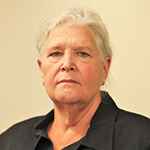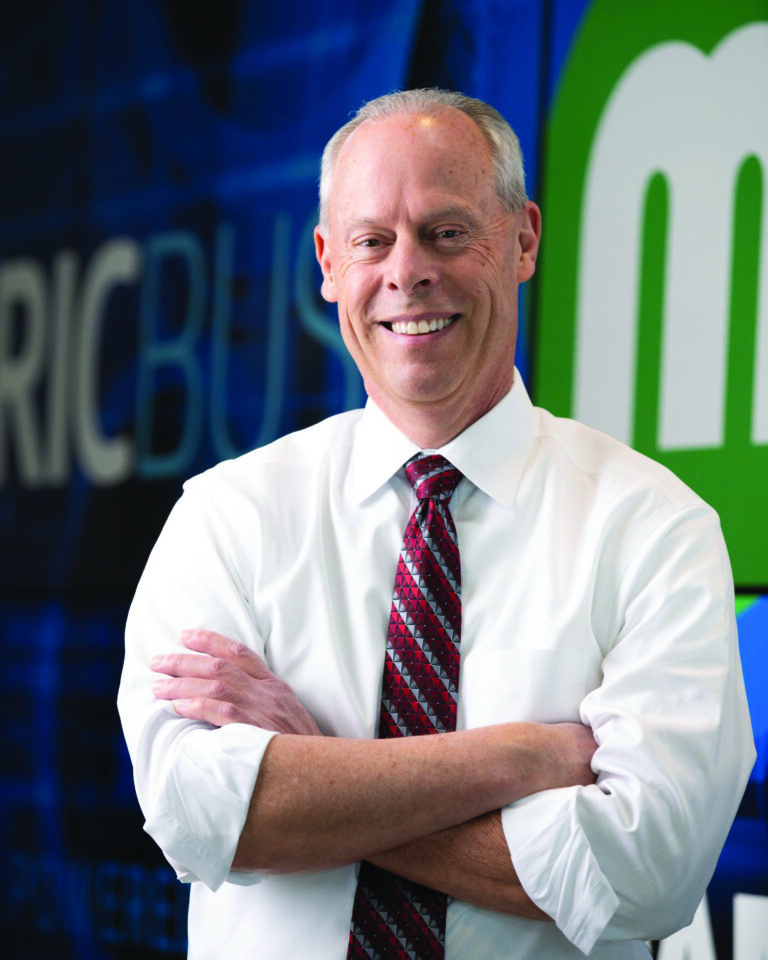With nearly two-thirds of American workers living with a mental illness or the symptoms of one, there is a critical need for employers to actively support their employees’ mental health, Quad Cities business leaders learned during the 2025 QCBJ Health Care Symposium.
“I want to talk about mental health in the workplace because more and more we are recognizing that mental wellness and mental wellbeing is a workplace priority,” Vera French CEO Dr. Rich Whitaker told a crowd of business and health care leaders on Wednesday, Feb. 5, at the Quad Cities Waterfront Convention Center in downtown Bettendorf.
Dr. Whitaker also shared insights he gleaned from leading a Quad Cities family of nonprofit Iowa corporations that includes Vera French Community Mental Health Center, Vera French Housing and the Vera French Foundation. “With the stiff competition for workers, anything we can do within reason to support workers makes sense,” Dr. Whitaker said.
He added “Workers who felt supported had better mental health outcomes and were more likely to report the positive impact of their work on their mental health. They were more comfortable talking about their mental health and they really engaged better in their organization.”
Joining Dr. Whitaker on the stage at the QCBJ’s second annual health symposium were: Nicole Carkner, executive director of the Quad City Health Initiative (QCHI); Gray Matters Collective Founder Haley DeGreve; and Jacqueline Robson of HyVee Health – Exemplar Care.
The event also featured a Workplace Wellness in Action panel discussion featuring a few Quad Cities employers. It was moderated by KWQC TV6 Anchor Marcia Lense.
The need to invest in workforce mental health care is real and it’s urgent, symposium speakers said. That includes in the Quad Cities where the number of mental illness diagnoses and symptoms has gone up “and it’s not just that people are reporting it more,” Dr. Whitaker said.
Ms. Carkner also shared some troubling mental wellness statistics from the Quad Cities 2024 Community Health Assessment.
Among the “treasure trove” of local health data revealed in that report is that nearly 30% of respondents surveyed in Rock Island, Scott and Muscatine counties reported that their mental health was fair or poor. Ms. Carkner said that’s up significantly from the 9% of respondents who answered that question when asked in 2007.
The study also looked at people who had been diagnosed with a depressive disorder. Since the assessment began asking that question in 2018 “we’ve seen those numbers grow from about 23.6% to the current 34%,” Ms. Carkner added. Equally troubling, is that when asked to rate the ease of getting mental health care in the study area, 38% of respondents rated it fair or poor. Those worrisome metrics are even higher among at-risk groups, she said.
To quantify the nation’s unmet workplace mental wellness needs, Dr. Whitaker also pointed to a 2023 survey in which 61% of 1,500 American workers reported having a mental illness or some mental health symptoms. The Mind Share Partners study also found that 71% of workers surveyed want to work at a place that is very supportive of their mental health.
Workplace results mixed
Are modern workplaces delivering? Results are mixed. Dr. Whitaker shared study results that showed that while 38% of respondents said their workplace was actually contributing to their mental wellbeing, 31% said their workplace caused issues with their mental health.
What makes a workplace good for employee wellbeing? It’s a “place where they actually feel safe to talk about mental health anxiety, depression,” Dr. Whitaker said. “It’s not a bad thing to feel those things sometimes as long as it’s not interfering with your productivity.”
Overall, Dr. Whitaker said “The good news is there are steps businesses can take to protect their workers’ mental health and wellbeing.”
For example, he said, “It’s good for your mental health to have separation between work and the rest of your life. That’s what work-life balance is all about. Make sure work is not dominating your life and that you do have a good separation there,” he said.
One way to do that is to allow remote work at least once a week. He also urged businesses to hire supportive and flexible managers. He shared the example of a Vera French worker whose supervisor changed her schedule so she could attend counseling sessions.
“A little bit of flexibility doesn’t cost much and it can go a long way in terms of productivity because that worker now feels more loyal to the Vera French and they’re actually doing better on their job because they’re getting the help that they need,” Dr. Whitaker said.
He also urged bosses to create a culture that respects vacation and personal days.
“Time off is earned and people see it that way,” he said. “When we make it difficult for people to take time off, maybe it’s for a mental health day or it’s for some much-needed vacation time … they feel guilty or maybe they have a hard time relaxing.That’s not good for your mental health.”
A recent study showed that employees would prefer to work a four-day week. For employers who can’t make that happen, Dr. Whitaker said, perhaps they should ask themselves “Can you accommodate one day working remotely a week?”
He also urged companies to train managers and supervisors in “emotional intelligence” because “when it’s lacking it can be hugely detrimental to a person’s mental health.”
For example, managers who are not savvy at reading people often struggle with communication. “They say things that may cause someone to feel guilty to a point where they don’t need to and they drive people away,” Dr. Whitaker said. “It’s terrible for retention and so with emotional intelligence training the worst case is that you will avoid liability related to complaints or a lawsuit.”
Hire supportive supervisors
He added that “healthy workers are productive workers and that harmony between manager and workers equals productivity every time. … Managers obviously need to drive results. The way they do that also shows they care.”
He also said that employers who give workers authority and responsibility over what they do,
“tend to overdeliver and that leads to great productivity as well.”
Dr. Whitaker urged companies to train supervisors to deal with mental health issues. That shows, he said, “No. 1 we care about you, not just our productivity.”
Employers also need to make workers feel they matter, treat them fairly and with dignity, and help them feel the meaning and purpose of their work. For example, he said, put in their job description what it is they’re doing and why it has value.
In addition to a great return on investment, employers who take such steps also will see “a significant improvement in retention.”
Ultimately, Dr. Whitaker said, “safety and security has to be a top priority.” That means knowing the warning signs of mental health challenges and how to respond to them.
Take, for example, the high-performing employee who suddenly exhibits rapid mood swings. “People sometimes have a grumpy day but now everyday seems to be negative,” he said. Be especially alert if they are violent or out of control.
Isolated remote workers are the most at risk and supervisors must remain especially alert to problems “because it’s way easier to let something go longer because you don’t actually interact with them,” Dr. Whitaker said. “You don’t see all of their nonverbals. Sometimes people won’t even get on camera, they‘re just audio. That’s something supervisors need to be really paying attention to.”
Education, action key
He also urged employers to ensure supervisors are trained to respond to a crisis. He, and Ms. DeGreve also pointed workplace supervisors to the 988 suicide prevention hotline which is available 24/7. “You don’t have to have a personal crisis yourself to call 988 and get some help with somebody who is seeming to have a big crisis,” Dr. Whitaker said. He also directed employers to NAMI’s “Navigating a Mental Health Crisis at Work” pamphlet. The “fantastic” publication can be found by searching National Alliance on Mental Illness’ website.
The health care symposium’s date was a special one for the Gray Matters Collective and its founder. That’s because, Ms. DeGreves said, that Feb. 5, 2025, marked the sixth anniversary of the suicide prevention and awareness organization being born at a student meeting at Augustana College.
To draw attention to challenges she and others living with mental illness face, the Deere & Co. communications manager shared a photo of herself smiling in front of large pieces of John Deere equipment.
“This picture would have been the last photo that anyone would have seen of me,” Ms. DeGreve told the Quad Cities leaders. “This was August 28th of 2019, and I had a plan to take my life. I knew what I was going to do and I knew how I was going to do it,” she said.
“I look at this picture and I know what I was going through but most people would look at this picture and think, ‘Wow, she’s got a cool job at Deere and is doing all the things.’ But that was not my reality.”
Since Gray Matters launched, Ms. DeGreve said, there has been some progress. “I have observed that there is more awareness, we’re talking about mental health now more than ever.” The problem is, however, “There’s a lot of talk, but there’s not a lot of action.”
She urged employers to look for ways in their workplace to help those with mental illnesses or mental health challenges and she left her audience with three things they can do to make a difference.
- Educate others and yourself about mental health including warning signs. Bosses should get training, share their own stories and give others permission to do the same. She also urged employers to find out more about another valuable mental health resource, warmlines at warmlines.org.
- Find resources and use them. For example, share and use the 988 suicide hotline, and provide easy access to Employment Assistance Programs.
- Culture and community: Decide what kind of culture, what kind of community you want to have in your workplace and then create a task force to help make that happen.
“If you did these three things you can actually make a difference,” she said.








